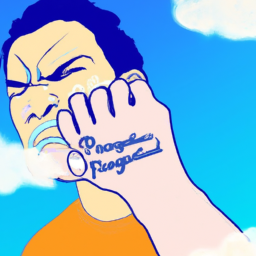Have you ever experienced a dream that made you feel disoriented and perplexed? I definitely have, especially when I’m not feeling well. It’s like my dreams morph into a bizarre, otherworldly realm that is hard to comprehend. It’s a strange phenomenon, but there is a scientific rationale behind it.
As it turns out, the connection between our dreams and our physical health is complex and multifaceted. When we’re sick, our bodies undergo a variety of changes that can disrupt our sleep patterns and alter the content of our dreams. Whether it’s due to sleep disturbances, medication side effects, or psychological factors, there are several reasons why our dreams might seem particularly weird and unsettling when we’re under the weather.
Let’s explore this topic further and uncover the mystery behind our strange sick dreams.
Key Takeaways
- Illness can disrupt sleep and lead to more intense and vivid dreams.
- Certain medications and drugs can cause strange or intense dream experiences.
- Stress and anxiety can impact the content and intensity of dreams.
- Coping strategies and prioritizing sleep habits can contribute to better sleep and dreams.
The Connection Between Dreams and Illness
When you’re sick, your body and mind are under stress, causing your dreams to become more bizarre and vivid than usual. This is because illness can affect the chemicals in your brain, which can lead to changes in the way you dream.
Additionally, when you’re sick, your body is working harder to fight off infection, which can also impact the quality of your sleep.
One theory as to why dreams become more unusual when you’re sick is that your brain is trying to process the physical and emotional stress that comes with being ill. Dreams can serve as a way for your brain to work through complex emotions and experiences, and when you’re sick, your brain may need to work overtime to process everything that’s going on.
However, the relationship between illness and dreams is not always straightforward, as sleep disruptions can also play a role in shaping the content of your dreams.
Sleep Disruptions
Sometimes slumber can be shattered by sneezes and sniffling, making it harder to get the rest you need. When you’re sick, your body is working hard to fight off the illness. This can cause disruptions in your sleep patterns, leading to more vivid and bizarre dreams. Here are a few reasons why:
-
Increased brain activity: When you’re sick, your body is releasing cytokines to fight off the infection. These cytokines can affect the brain, leading to increased activity in certain areas. This can cause more intense and vivid dreams.
-
Medications: Many medications used to treat illnesses can cause disruptions in sleep patterns. This can lead to more vivid and strange dreams.
-
Fever: When you have a fever, your body is working hard to fight off the infection. This can cause disruptions in your sleep patterns and lead to more vivid dreams.
-
Dehydration: When you’re sick, it’s important to stay hydrated. However, if you’re not drinking enough fluids, you may become dehydrated. This can also affect your sleep patterns and lead to more vivid dreams.
As if being sick wasn’t bad enough, having weird dreams can make it even more frustrating. However, it’s important to remember that these disruptions are temporary and will go away once you’ve recovered.
Now, let’s talk about another reason why your dreams might be strange: medication side effects.
Medication Side Effects
I’ve noticed that certain medications can have a big impact on the content and vividness of my dreams.
It’s not uncommon for prescription drugs to cause strange or intense dream experiences.
Some of the most commonly reported medications that affect dreams include antidepressants, blood pressure drugs, and some allergy medications.
How Medications Affect Dreams
You may notice that medications can affect your dreams in some strange ways. I once took a medication for allergies and it gave me the most vivid and bizarre dreams I’ve ever experienced. It felt like I was in an alternate reality where everything was upside down, and I couldn’t make sense of anything.
It was a strange mix of fear and fascination, and I woke up feeling disoriented and exhausted. If you’re taking medication and experiencing weird dreams, you’re not alone. Some medications can affect the way you dream, making them more vivid, intense, or even disturbing.
This can be especially true for medications that affect brain chemistry or sleep patterns. In the next section, we’ll explore some common medications that cause vivid dreams.
Common Medications That Cause Vivid Dreams
Medications can have a significant impact on the intensity and content of our dreams, with some common drugs causing particularly vivid and surreal experiences. Antidepressants, for example, are known to increase the frequency and intensity of dreams, while medications used to treat Parkinson’s disease can cause extremely vivid and often frightening dreams.
Drugs that affect serotonin levels, such as some migraine medications and certain illicit substances, can also result in vivid and bizarre dream content. It’s important to note that not everyone will experience these effects, and the intensity of the dream experience can vary from person to person.
Additionally, it’s not always clear why certain medications have such an impact on our dreams. While some drugs directly affect neurotransmitters that regulate sleep and dreaming, others may indirectly affect our dream content by altering our mood or cognitive function. Regardless of the underlying mechanism, it’s clear that medications can have a powerful effect on our dream experiences.
This is just one of the many factors that can contribute to the strange and surreal experiences we often have while asleep. Next, we’ll explore some of the psychological factors that can influence our dreams.
Psychological Factors
I want to talk about the psychological factors that affect our dreams. Stress and anxiety can have a big impact on the content and intensity of our dreams. Coping strategies, such as mindfulness and relaxation techniques, can help alleviate these negative effects and lead to more positive dream experiences.
Adjust the paragraph structure in the Input to logically group complete sentences on their own lines, with a double new line after. Use contractions.
Stress and Anxiety
Feeling stressed or anxious while sick can cause your dreams to take on a surreal and bizarre quality. When your body’s already fighting off an illness, additional stress and anxiety can make your brain work overtime while you sleep. This can lead to dreams that are filled with strange imagery, disjointed storylines, and nonsensical events.
The intensity of your dreams while sick can also be influenced by the severity of your illness. For example, if you have a high fever, your body may be overheating and causing you to feel restless and uncomfortable. This can impact the quality of your sleep and lead to more vivid and unusual dreams.
Coping strategies, such as relaxation techniques or meditation, can help to reduce your stress levels and promote more restful sleep.
Coping Strategies
You can reduce stress and promote restful sleep by using coping strategies such as relaxation techniques and meditation. When I’m feeling sick, I often find it difficult to fall asleep, and my dreams can be particularly strange and unsettling.
However, I’ve found that taking time to practice deep breathing or listen to calming music can help me relax and quiet my mind before bed. Similarly, guided meditations or visualization exercises can help me focus on positive thoughts and feelings, rather than dwelling on my illness or worries.
In addition to relaxation techniques, taking care of my physical health also plays a role in improving my sleep and dreams while sick. Making sure to stay hydrated, eat nutritious foods, and avoid caffeine or alcohol before bed can all contribute to a better night’s rest.
By taking these steps to support my overall well-being, I’m better able to cope with the stress and discomfort of being sick and can wake up feeling more refreshed and energized.
Transition: By implementing these coping strategies and taking care of my physical health, I’ve found that I’m better able to enjoy restful sleep and more positive dreams, even when I’m not feeling my best.
Tips for Better Sleep and Dreaming
Getting a good night’s rest and practicing relaxation techniques can enhance the quality of sleep and lead to more pleasant dreams. When I am feeling sick, I find it especially important to prioritize my sleep habits. Here are some tips that have helped me improve my sleep and dreaming:
| Tip | Description | Benefits |
|---|---|---|
| Stick to a sleep schedule | Go to bed and wake up at the same time every day, even on weekends | Helps regulate the body’s internal clock |
| Create a relaxing bedtime routine | Take a warm bath, read a book, or listen to calming music before bed | Signals to the brain that it’s time to wind down |
| Make your sleep environment comfortable | Use comfortable bedding, keep the room cool and dark, and minimize noise and distractions | Helps promote relaxation and reduce interruptions |
| Avoid stimulating activities before bed | Avoid caffeine, alcohol, and electronic devices for at least an hour before bed | Helps calm the mind and prepare for sleep |
| Practice relaxation techniques | Try deep breathing, progressive muscle relaxation, or visualization exercises | Helps reduce stress and promote relaxation |
By implementing these tips, I have found that my sleep quality has improved and my dreams are less bizarre and unsettling. While it may not be possible to completely control our dreams, taking steps to improve our sleep habits can certainly lead to more pleasant and restful nights.
Frequently Asked Questions
What are some common themes or symbols that appear in dreams when someone is sick?
When I’m sick, my dreams often involve feeling lost or trapped, encountering strange creatures or people, or being in situations that are unsettling or surreal. These themes may reflect my subconscious processing of physical discomfort and illness.
Can dreaming while sick actually make the illness worse?
Dreaming while sick can feel like a carnival ride gone wrong. It’s not uncommon for nightmares to add insult to injury. However, there’s no evidence that dreaming can make the illness worse.
Are there any natural remedies or supplements that can improve the quality of sleep and dreams during illness?
I’ve found that taking melatonin supplements before bed helps me get better quality sleep and more vivid dreams while sick. Herbal teas like chamomile or valerian root can also be calming.
How do dreams differ between acute illnesses and chronic illnesses?
Dreams when I have acute illnesses are like a rollercoaster ride, intense and unpredictable. But with chronic illnesses, they are like a familiar movie on repeat, comforting yet exhausting. Both can be strange and vivid.
Is there a difference in dream content between physical illnesses and mental illnesses?
I’ve noticed that my dreams are often more vivid and intense when I’m going through a physical illness compared to a mental one. However, I’m not sure if there’s a clear difference in dream content between the two types of illnesses.
Conclusion
So, why are dreams weird when we’re sick? After researching and exploring different factors, it seems like there isn’t one definitive answer.
However, we can conclude that there are many potential reasons for strange dreams during illness, including sleep disruptions, medication side effects, and psychological factors.
It’s important to remember that everyone’s experience is different and that there’s no one-size-fits-all explanation for why we dream the way we do. Some people may not experience any unusual dreams when they’re sick, while others may have more vivid and bizarre dreams than usual.
Regardless, it’s essential to take care of ourselves when we’re not feeling well, including getting enough rest, reducing stress, and seeking medical attention if necessary. By doing so, we can hopefully improve the quality of our sleep and overall well-being.
So, next time you’re feeling under the weather and experiencing strange dreams, remember that it’s a normal part of the healing process, and try to take care of yourself as best as possible.









